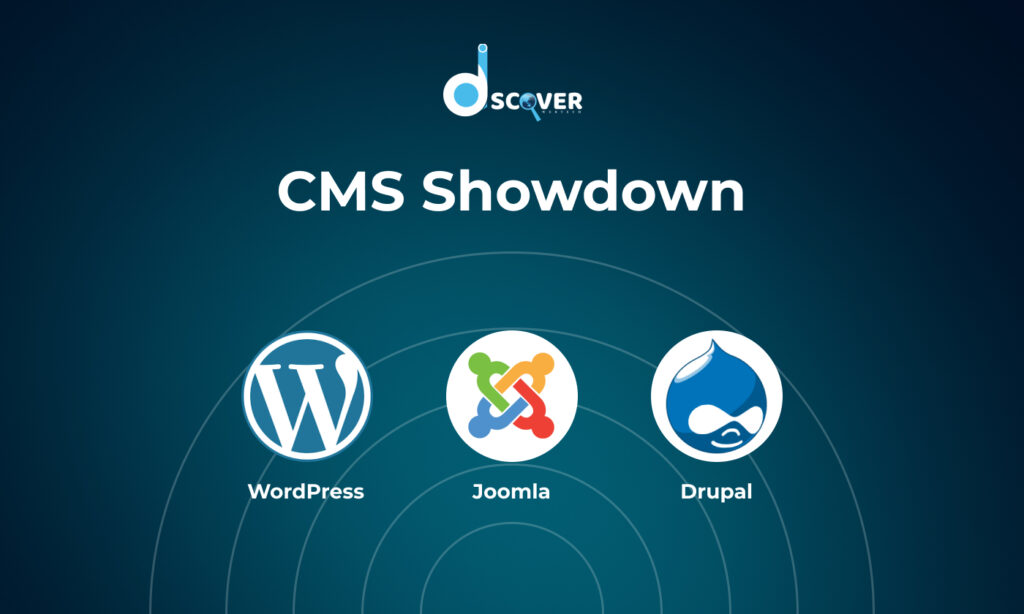
Choosing the right Content Management System (CMS) is crucial for building and managing your website effectively. Among the myriad options available, WordPress, Joomla, and Drupal stand out as the most prominent platforms. Each offers unique features, advantages, and challenges. This comprehensive comparison aims to help you determine which CMS aligns best with your needs.
Understanding CMS Platforms
A Content Management System is software that facilitates the creation, management, and modification of digital content without requiring extensive technical knowledge. CMS platforms empower users to build websites ranging from simple blogs to complex e-commerce sites.
Market Share Overview
As of 2025, the CMS market distribution is as follows:
- WordPress: Dominates with a 61.4% market share, powering approximately 43.5% of all websites.
- Joomla: Holds a 2.1% market share, used by about 1.5% of websites.
- Drupal: Accounts for a 1.2% market share, utilized by roughly 0.9% of websites.
These figures highlight WordPress’s significant lead in the CMS landscape.
Ease of Use
- WordPress: Renowned for its user-friendly interface, WordPress is ideal for beginners. Its intuitive dashboard allows users to manage content, install plugins, and customize themes effortlessly.
- Joomla: Offers a balance between functionality and usability. While it has a steeper learning curve than WordPress, users with some technical background can navigate its features effectively.
- Drupal: Geared towards developers and users with advanced technical skills. Its complex interface and terminology may be challenging for novices but offer robust capabilities for creating intricate websites.
Customization and Flexibility
- WordPress: Boasts an extensive library of themes and plugins, enabling users to add various functionalities and design elements. This flexibility makes it suitable for a wide range of websites.
- Joomla: Provides a robust set of built-in features and extensions. It supports complex site structures and offers greater flexibility in displaying non-standard content types.
- Drupal: Excels in customization and scalability. It allows for the creation of highly tailored content types and views, making it ideal for complex, large-scale websites.
Performance and Speed
Website performance is critical for user experience and SEO ranking.
- WordPress: Performance can vary based on themes and plugins used. With proper optimization, such as caching and image compression, WordPress sites can achieve excellent speed.
- Joomla: Offers robust performance capabilities. Efficient use of caching and optimization techniques can result in fast-loading websites.
- Drupal: Known for its high performance and scalability. It’s capable of handling large amounts of data and traffic without compromising speed.
Security
Security is a paramount concern for any website owner.
- WordPress: Regular updates and a vast selection of security plugins help maintain site security. However, its popularity makes it a frequent target for attacks, necessitating diligent maintenance.
- Joomla: Provides robust security features but requires manual implementation of updates and patches. Its smaller community means fewer immediate fixes for vulnerabilities.
- Drupal: Renowned for its strong security measures. It’s often the choice for government and enterprise websites requiring stringent security protocols.
SEO Capabilities
Effective Search Engine Optimization (SEO) is vital for online visibility.
- WordPress: Offers numerous SEO plugins, such as Yoast SEO, facilitating easy optimization of content and meta tags. Its clean code and structure contribute to better search rankings.
- Joomla: Includes basic SEO settings out of the box and supports extensions for enhanced SEO capabilities. However, achieving optimal SEO may require more manual configuration.
- Drupal: Provides robust SEO modules and allows for detailed customization of SEO elements. Its flexibility enables the creation of SEO-friendly websites, though it may require technical expertise.
Community and Support
A strong community can be invaluable for troubleshooting and resources.
- WordPress: Boasts a vast, active community with extensive documentation, forums, and tutorials. This support network makes finding solutions and guidance relatively easy.
- Joomla: Has a supportive community with forums and documentation. While smaller than WordPress’s, it remains active and helpful.
- Drupal: Features a dedicated community of developers and users. The comprehensive documentation and forums are geared towards more technically inclined users.
Cost Considerations
Budget plays a significant role in CMS selection.
- WordPress: The core software is free, with numerous free themes and plugins available. Premium themes and plugins are optional and vary in price. Development costs are generally lower due to its widespread use.
- Joomla: Also free to use, with various free and paid extensions. Development costs can be higher due to a smaller pool of developers.
- Drupal: Free core software, but customization often requires professional developers, leading to higher costs. Its complexity can result in increased development time and expense.
Multilingual Support
For global reach, multilingual capabilities are essential.
- WordPress: Requires plugins like WPML to enable multilingual functionality. While effective, it adds to the site’s complexity.
- Joomla: Offers built-in multilingual support, allowing for straightforward creation of multilingual sites without additional extensions.
- Drupal: Provides robust multilingual capabilities out of the box, making it suitable for complex multilingual websites.
Final Thoughts
Each CMS has its strengths and weaknesses.
- Choose WordPress if you are looking for ease of use, extensive customization options, and a vast support community. It’s best for bloggers, small businesses, and general-purpose websites.
- Choose Joomla if you want a balance between customization and usability, especially for mid-sized business websites that require structured content management.
- Choose Drupal if you need high-level customization, scalability, and top-notch security for large and complex websites.
By assessing your website goals, technical skills, and budget, you can determine the CMS that best suits your needs.

